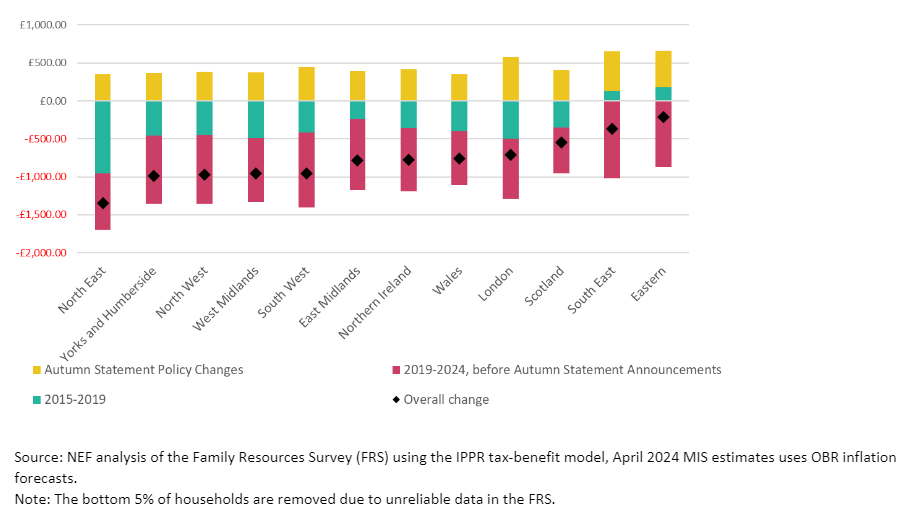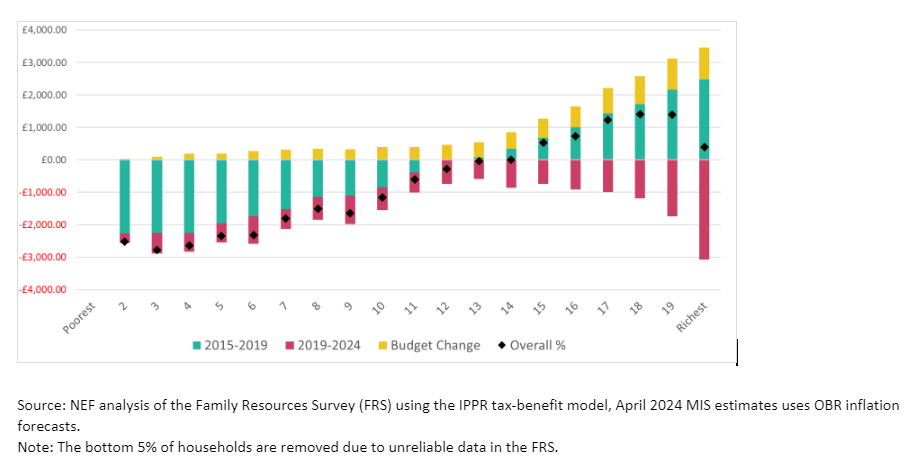Autumn statement: All regions are worse off since 2015, new analysis finds
Analysis shows that Britian has been “levelled down” despite promises to reverse regional inequalities.
22 November 2023
All UK regions are on average worse off today than they were eight years ago, an analysis of today’s Autumn Statement by the New Economics Foundation has found.
With an election looming the government faces an uphill struggle to show that any region of the UK is better off now than it was, despite promises to “unite and level up” the country at the last election.
From Penzance to Perth, families have seen their incomes go through the floor.
Between 2015 and 2024 annual incomes in the North East will have fallen by more than £1,300, and in the rest of the North of England, by £1,000.
The analysis found that between 2015 and 2024 the bottom 70% of families in the UK were worse off by up to £3,000. This is due to government policy failing to tackle the cost of living crisis and the levelling down of our regions.
Figure 1: All UK regions worse off since 2015
Change in family disposable income between April 2015 and April 2024 by UK region, income changes broken down before and after 2019 and before and after Autumn statement announcements.

Figure 2: Poorest 70% have got poorer since 2015, while the richest have got richer
Change in family disposable income between April 2015 and April 2024 by income vingtile, income changes broken down before and after 2019 and before and after autumn statement announcements

Hannah Peaker, Director of Policy and Advocacy at NEF said:
“Levelling down was never in the manifestos, but the facts speak for themselves: we are all poorer because of decisions made by successive Conservative Prime Ministers since 2015, and today’s Autumn Statement gives us no reason to think things will get any better.”
“In two years, the cost of energy leapt 49% and the cost of food is up 29% with prices still rising. For the most vulnerable families, this is a living standards disaster. A small cut to National Insurance will provide little relief, and it will benefit the wealthiest households and regions the most – at the same time as forcing further cuts to our already fragile public services.”
“In the long run, any plan to tackle these issues needs to grasp the fundamental drivers of regional inequalities, which will require giving local areas the powers and funding to make long-term investments in things like housing, transport and places. But in the short term, more should be done to help families through the social security system, instead of putting them under further pressure of sanctions. NEF’s proposal for a Living Income would ensure an income floor that reflects the true cost of living for families.”
Dominic Caddick, Economist at NEF, said:
“This would be an indictment of any government, let alone one for whom “levelling up” is at the heart of its agenda. The families and places that were already poorest have continued to fall even further behind the rest of the country.
“This analysis shows the social safety net is in tatters. We need to completely reimagine the way we support the most vulnerable in our society. We need a living income to help people deal with the challenges and opportunities presented by the fast-changing economy we’re all living in.”
Analysis carried out using the IPPR tax and benefit model w based on data from the Department for Work and Pensions (DWP) Family Resources Survey and the latest economic forecasts and the Office for Budget Responsibility (OBR).
ENDS
Notes
The New Economics Foundation is a charitable think tank. We are wholly independent of political parties and committed to being transparent about how we are funded.
Topics Local economies






